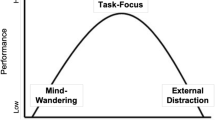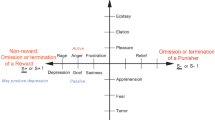Abstract
It has been suggested that smoking may reduce affect in high-arousal situations by blocking peripheral physiological cues. The effects of smoking on perception of one type of physiological response, muscle activity, was evaluated in two studies. In study 1 male and female smokers were exposed to four conditions: high and low arousal crossed with smoking or deprivation. Results showed that smokers produce less muscle activity during high-than low-arousal stituations, and that smoking reduced sensitivity to muscle activity in females, but enhanced it in males. These perception differences were not related to arousal as assessed by heart rate, which was elevated in all high-arousal situations. When compared to nonsmokers, smokers in a deprived state generate more muscle activity during the perception task, but showed no differences in sensitivity. These results represent the initial demonstration that smoking can alter the perception of physiological processes. Study 2 was designed to determine whether the effects of smoking were specific to muscle tension or indicative of a more generalized perceptual change. Perception of muscle tension and decibel levels were compared in smoking or deprived female smokers who were in the high-arousal situation. Results for muscle-tension perception in high-arousal situations were similar to those in study 1, but smoking did not alter perception of auditory stimuli.
Similar content being viewed by others
References
Benson H (1975) The relaxation response. Avon Books, New York
Best JA, Hakstian AR (1978) A situation-specific model for smoking behaviour. Addict Behav 3:79–92
Blanchard EB, Jurish SE, Andrasik F, Epstein LH (1981) The relationship between muscle discrimination ability and response to relaxation training in three kinds of headaches. Biofeedback Self Regul 6:537–546
Eysenck HJ (1980) The causes and effects of smoking, Sage, Beverly Hills
Fagerstrom K-O, Gotestam KG (1977) Increase of muscle tonus after tobacco smoking. Addict Behav 2:203–206
Frith C (1971) Smoking behaviour and its relation to the smoker's immediate experience. Br J Soc Clin Psychol 10:73–78
Gilbert DE (1979) Paradoxical tranquilizing and emotion-reducting effects of nicotine. Psychol Bull 86:643–661
Golding J, Mangan GL (1982) Arousing and de-arousing effects of cigarette smoking under conditions of stress and mild sensory isolation. Psychophysiology 19:449–456
Gritz ER (1980) Smoking behavior and tobacco abuse. In: Mello NK (ed) Advances in substance abuse: behavioral and biological research, vol. 1. Jai Press, Greenwich Connecticut
Lyon R, Tong J, Leigh G, Clare J (1975) The influence of alcohol and tobacco on the components of choice reaction time. J Stud Alcohol 36:581–596
Mendenhall WL (1925) A study of tobacco smoking. Am J Physiol 72:549–557
Myrsten A, Anderson K, Frankenhaeuser M, Elgerot A (1975) Immediate effects of cigarette smoking as related to different smoking habits. Percept Mot Skills 40:515–523
Nesbitt PD (1973) Smoking, physiological arousal, and emotional response. J Person Soc Psychol 25:137–144
Pomerleau OF, Adkins DM, Pertschuk M (1978) Predictors of outcome and recidivism in smoking-cessation treatment. Addict Behav 3:65–70
Schachter S, Singer JE (1962) Cognitive, social and physiological determinants of emotional state. Psychol Rev 65:129–128
Shiffman S (1982) Relapse following smoking cessation: a situational analysis. J Consult Clin Psychol 50:71–86
Stevens SS (1975) Psychophysics. John Wiley, New York
Wesnes K, Warburton DM (1978) The effects of cigarette smoking and nicotine tablets upon human attention. In: Thornton RE (ed) Smoking behaviour: physiological and psychological influences. Churchill Livingstone, Edinburgh
Author information
Authors and Affiliations
Rights and permissions
About this article
Cite this article
Epstein, L.H., Dickson, B.E., McKenzie, S. et al. The effect of smoking on perception of muscle tension. Psychopharmacology 83, 107–113 (1984). https://doi.org/10.1007/BF00427433
Received:
Accepted:
Issue Date:
DOI: https://doi.org/10.1007/BF00427433




